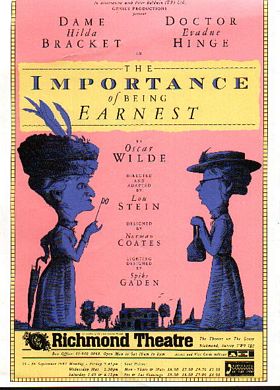THE IMPORTANCE OF BEING
EARNEST by Oscar Wilde
Venue: Richmond 1987
Directed and adapted by: Lou Stein

Venue: Richmond 1987
Directed and adapted by: Lou Stein

| Lady Bracknell | 'Dame Hilda Bracket' Patrick Fyffe |
| Miss Prism | 'Doctor Evadne Hinge' George Logan |
| John Worthing | Simon Dutton |
| Algernon Moncrieff | Robin Kermode |
| Cecily Cardew | Kate O'Sullivan |
| Gwendolen Fairfax | Tara Ward |
| Canon Chasuble | Fred Evans |
| Lane | Chubby Oates |
Article
Lou Stein has been an indefatigable searcher for new talent in his various projects around London—he has been associated with several fringe theatres and is currently artistic director of Watford’s Palace Theatre where he is presenting his staging of A Doll's House. In addition he has been buzzing around the Whitehall Theatre intent on a rather unusual project, The Importance of Being Ernest, starring of those two ‘dear ladies’, Hinge and Bracket.
It is Hinge and Bracket’s first appearance in a play—and oddly enough, their very first association with a director. Did this bode well for the very wide open, very American, talents of Mr. Stein? “As soon as we met, Patrick Fyffe and George Logan said to me in a very straightforward manner ‘we’ve never worked with a director, we have no idea what it's like’. They've always directed themselves, they use the audience to judge their work. So the very first thing in starting the project was to say to them ‘now I am going to be your ears out there, and I shall be the one saying this works, this doesn't and so on,” said Stein.
“I actually found it very easy because they were willing to make that leap, and for them it was a very big leap. I also found that my experience at Latchmere—where we did a lot of late-night revue and I had worked with a lot of comics, was invaluable. It helped me to develop a dialogue in working with Patrick and George. We have rehearsed the play very traditionally, three weeks of rehearsal at six hours a day, very much as I would rehearse A Doll's House. It was a very disciplined period.”
“We had a very good tour and excellent houses in the four places we played—Bath, Lincoln, Brighton and Richmond, one week each, and I kept close tabs on it at each theatre, watching and giving notes. It's been a busy time, but I've enjoyed it. I don't think we could have done more than a week in most of those dates, though Richmond could have taken another week. For a time we had thought of starting the show off at Watford, and I think it would have sold out there, but because of the planning necessary and and timing, we couldn't do it. I plan six months in advance, which is the bare minimum, and really in terms of sketching things out I have to be a year in advance. We do a block system of plays whereby each runs for a set number of weeks and then closes, yet if we could have done it for four weeks I think Hinge and Bracket would have pulled in the audience. They have a very big appeal and let's not forget that Oscar Wilde is involved in this and the way I'm doing it 80 per cent of the play is intact as written, and the rest is a play within a play that I had supplied for Hinge and Bracket.”
Was this ‘adaptation’ of Wilde's great comedy something they did together? “No, there was no way I could work like that—when the idea was brought to me by the producer Lucinda Craig-Harvey, of a Genius Productions, she said how do we do it? The main problems hadn't been thought through, that Miss Prism is a relatively small part and Lady Bracknell is not in fact a large role. So I had to find a way of adapting the play to suit Hinge and Bracket’s talents. I struck on this idea of a play within a play. I found a trigger that puts them both on the stage more than they are in the play. I think it works—it did involve knowing their work and seeing tapes of TV shows. I saw their Comedy Theatre production and that one really got me excited about the project. Seeing them live made me realise how clever they really are. I then began to understand how I could use what they could bring to the play. The important thing I think it is that the adaptation works them into the play, rather than the play serving them, and they accept that notion. The real star of the show is still Oscar Wilde."